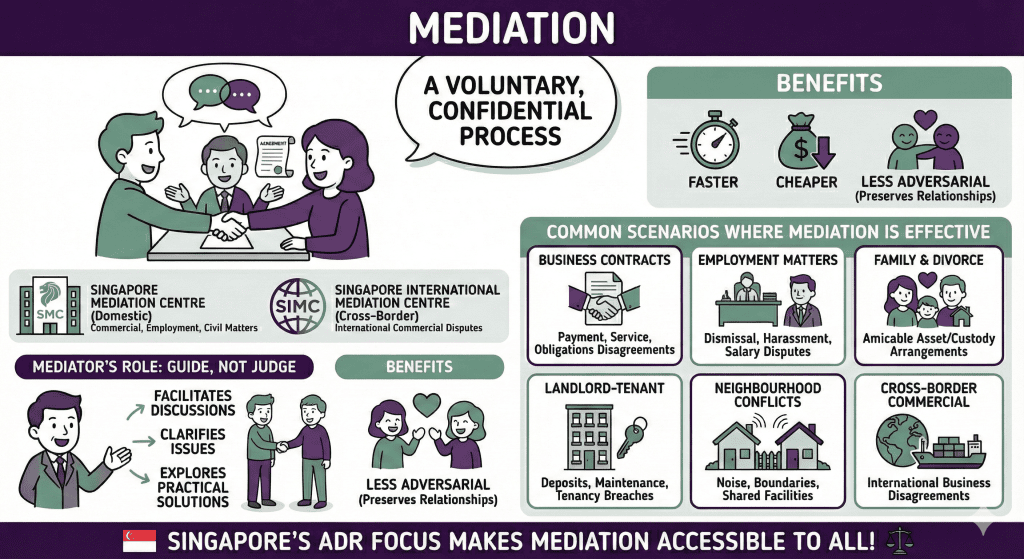General |
Mediation: A Practical, Cost-Effective Way to Resolve Disputes

A Sensible Alternative to Litigation

Disputes can arise in many forms: commercial disagreements, employment issues, family conflicts, or breaches of contract. Many people dread the thought of escalating matters to court, fearing high costs, long delays, and damaged relationships.
Mediation offers a calm and constructive alternative. It is a structured process facilitated by a neutral third party, aimed at helping parties reach a mutually acceptable resolution.
In Singapore, mediation is increasingly relied upon across a wide range of matters, from commercial to personal disputes. Understanding how it works allows parties to resolve issues efficiently, often without the need for formal litigation.
| FACTORS | MEDIATION | TRIAL |
|---|---|---|
| Control Over Outcome |
The mediator will focus on helping you and the other party to come to a resolution that aligns with your concerns and needs, and NOT determine who’s at fault in a dispute. You and the other party will decide whether to come to a resolution and terms of the resolution. | Judge will determine the case based on evidence. |
| Confidentiality | All that were discussed during a mediation session by all parties will remain private and confidential. | Court hearings are open to the public. |
| Without Prejudice |
The discussions that takes place during a mediation session are “without prejudice“. This means that what has been said by you or the other party will not be used against you as evidence if your case proceeds to trial. | Other than communications and documents that are “without prejudice“, all else are not privileged. |
| Flexibility | The mediation process is flexible and more informal. | A court is formal. |
| Cost | Dispute resolution through mediation are less costly in general as you will be spending less time to resolve the dispute, and will save on legal fees that would have been spent on a trial (for civil cases). | Trial can be costly. |
What Is Mediation?

Mediation is a voluntary, confidential process where a neutral mediator facilitates discussions between parties to help them reach a mutually acceptable agreement. It is part of Singapore’s broader dispute resolution landscape and is supported by institutions
- Singapore Mediation Centre (SMC) – focuses on domestic commercial, employment, and civil matters.
- Singapore International Mediation Centre (SIMC) – handles cross-border commercial disputes
Unlike a judge or arbitrator, a mediator does not impose a decision. Instead, they guide conversations, help clarify issues, and assist parties in exploring practical solutions.
Mediation is often faster, cheaper, and less adversarial than court proceedings—making it an attractive option for those who value confidentiality, control, and preserving relationships.
Common Scenarios Where Mediation Is Effective
Mediation is more common in daily life than most people realise. Here are some real-world examples where it often helps:
| Scenario | Examples |
| Contract disputes between businesses | Disagreements over payment terms, service delivery, or contractual obligations |
| Employment related matters | Claims involving dismissal, harassment, or salary disputes. |
| Family and divorce matters | Couples seek amicable arrangements on asset division or custody without lengthy court battles. |
| Landlord-tenant issues | Disputes arise over deposits, maintenance, or breaches of tenancy agreements. |
| Neighbourhood conflicts | Residents disagree over noise, property boundaries, or shared facilities. |
| Cross-border commercial disagreements | Businesses from different countries prefer mediation over complex international litigation. |
Singapore’s emphasis on Alternative Dispute Resolution (ADR) has made mediation accessible across a wide range of industries and personal matters.
Legal Support and Framework for Mediation in Singapore
Singapore actively promotes mediation through several legal frameworks and initiatives:
- Mediation Act 2017: This law provides a formal structure for mediation agreements to be legally enforceable if parties choose to register their mediated settlement.
- Singapore Mediation Centre (SMC): A leading institution offering mediation services for commercial, employment, and other civil disputes.
- Singapore International Mediation Centre (SIMC): Specialises in cross-border and international commercial mediation.
- Court-Directed Mediation: In many civil cases, courts encourage or require parties to attempt mediation before proceeding to trial.
These frameworks ensure that mediation is not only an informal process but can also lead to outcomes with real legal standing when properly handled.
Why Choosing Mediation Early Makes a Difference
It’s natural to want to “wait and see” if a dispute will blow over. But seeking mediation early offers several clear advantages:
- Preserves relationships – Mediation focuses on collaboration, helping parties maintain business or personal relationships.
- Saves time and costs – Mediation is often much faster and cheaper than litigation, avoiding long court battles.
- Flexible and confidential – Parties control the process, and discussions are private; important for sensitive matters.
Starting mediation early can prevent conflicts from escalating, allowing for more amicable, creative solutions compared to adversarial courtroom battles
How RBN Chambers Can Help with Mediation Matters
At RBN Chambers, we believe mediation should be a first step in resolving disputes and not a last resort.
Our team:
- Advises on whether mediation is suitable for your dispute.
- Prepares you thoroughly for each session.
- Supports negotiations to secure fair, enforceable outcomes.
Whether your dispute involves a business partner, employer, contractor, or foreign party, we provide comprehensive legal and strategic support throughout the mediation process.
FAQs
When Mediation is Not an Ideal Mode of Resolution to Resolve Commercial Disputes?
Using mediation to resolve commercial disputes may not be appropriate if you require the Court to make a decision on a legal issue such as interpreting a clause for your company’s standard contract or either party shows no desire to mediate.
If mediation is not feasible, arbitration can be a possible mode of resolution for commercial disputes.
Is mediation legally binding in Singapore?
Mediation itself is voluntary, but if parties reach an agreement and formalise it properly, it can become legally binding under the Mediation Act 2017.
How long does mediation usually take?
Most mediations can be completed within one day or a few sessions, depending on the complexity of the dispute.
Can I still go to court if mediation fails?
Yes. Mediation does not prevent you from pursuing litigation or arbitration if a settlement cannot be reached.
How much does mediation cost in Singapore?
Costs vary depending on the service provider (e.g., SMC, SIMC) and complexity of the case but are usually far lower than court proceedings.
How can RBN Chambers help me in mediation?
RBN Chambers provides legal guidance before, during, and after mediation, helping you prepare your case, negotiate strategically, and finalise enforceable agreements.

Delivering Solutions not just Answers to your legal disputes
We provide solutions to the table for all our clients regardless of the scale or complexity of the cases. Let us know how we can help.
Contact UsAny information of a legal nature in this blog is given in good faith and has been derived from resources believed to be reliable and accurate. The author of the information contained herein this blog does not give any warranty or accept any responsibility arising in any way, including by reason of negligence for any errors or omissions herein. Readers should seek independent legal advice.

